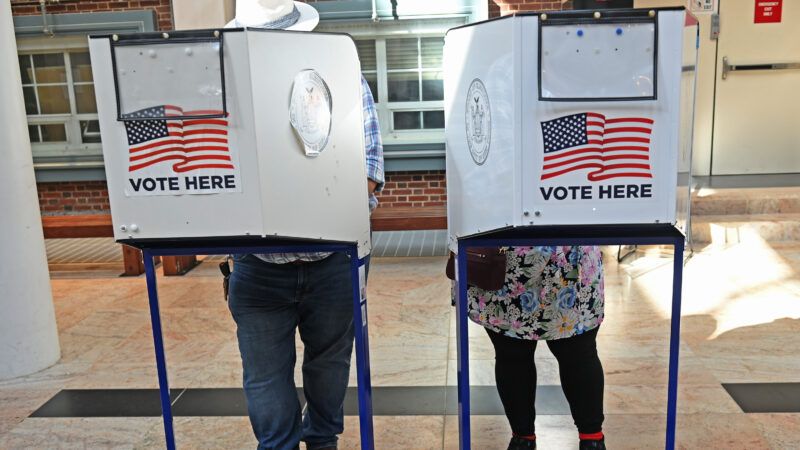Neither Democrats Nor Republicans Have a Clear Advantage Going Into Election Day
Plus: University cancels "The Problem of Whiteness" class, Twitter's snowflake-in-chief, and more...

Neither Republicans nor Democrats have a clear advantage as we head into Election Day tomorrow. Polls show the two major parties nearly tied when it comes to potential votes.
One of the latest polls comes from NBC, which found that among registered voters 47 percent said they prefer a Democrat-controlled Congress and 47 percent would like to see Republicans in control. Among those who described themselves as likely to vote, 48 percent supported Democrats and 47 percent supported Republicans, a difference that falls within the poll's margin of error. And Democrats—who had been lagging on interest in the midterm elections—have now caught up to the enthusiasm of their GOP counterparts, NBC found. Seventy-three percent of each now rate their interest as a "9" or "10" on a 10-point scale.
But behind these numbers, some potentially bad news for Democrats still lurks:
Only 44% of voters approve of President Biden's job performance, while 53% disapprove; more than 70% think the country is headed in the wrong direction; and a combined 81% say they are "very" or "somewhat" dissatisfied with the U.S. economy.
Figures like these make it less likely that Democrats will be able to retain control of either the U.S. House of Representatives or the Senate.
In the Senate—now split 50–50—gaining at least one more seat will give either side the majority. There are 35 Senate seats up for grabs, with 12 of these currently held by Democrats and 23 currently held by Republicans. "Though Republicans are defending more seats overall, only five are rated competitively by the Cook Political Report," notes Bloomberg Government. "Democrats are defending four seats rated competitively."
Republicans need to gain just five seats to take control of the House—and some analysts predict that they will do this easily. "The atmosphere is so murky that some Democratic strategists privately acknowledge that a loss of 20 seats would be a good night," The Washington Post reports.
Another broad poll released yesterday—this one from The Washington Post and ABC—also found a relatively even split between support for Republicans and Democrats. Among registered voters, 49 percent said they would vote for the Republican candidate in their congressional district and 48 percent for the Democratic candidate. And among likely voters, the split was 50 percent Republican and 48 percent Democrat. But Republican voters were significantly more likely to say it was certain that they would vote and to say they had been paying close attention to the election.
If you want to get more into the nitty gritty of polling on competitive races, FiveThirtyEight has you covered.
Politico also offers a thorough breakdown, focusing on the states likely to determine who control the Senate. "The midterms are coming to a close with a significant divide between some of the independent polling—especially surveys conducted using traditional telephone methodology, which has struggled to capture Republican support in recent elections—and polls released by GOP-affiliated firms, with their obvious self-interest," it notes.
The 10 most competitive Senate races include:
Arizona: Sen. Mark Kelly (D) vs. Blake Masters (R)
Colorado: Michael Bennet (D) vs. Joe O'Dea (R)
Georgia: Raphael Warnock (D) vs. Herschel Walker (R)
Nevada: Catherine Cortez Mastro (D) vs. Adam Laxalt (R)
New Hampshire: Maggie Hassan (D) vs. Don Bolduc (R)
North Carolina: Cheri Beasley (D) vs. Ted Budd (R)
Ohio: Tim Ryan (D) vs. J.D. Vance (R)
Pennsylvania: John Fetterman (D) vs. Mehmet Oz (R)
Washington: Patty Murray (D) vs. Tiffany Smiley (R)
Wisconsin: Mandela Barnes (D) vs. Ron Johnson (R)
In the House, the 35 races deemed most competitive by The Cook Political Report include contests in Arizona, California, Colorado, Connecticut, Illinois, Indiana, Maine, Michigan, Minnesota, Nebraska, Nevada, New Hampshire, New Mexico, New York, North Carolina, Ohio, Oregon, Pennsylvania, Rhode Island, Texas, Virginia, and Washington.
FREE MINDS
The University of Chicago canceled a class called "The Problem of Whiteness" after conservative students and activists complained. Conservatives of late have imagined themselves the defenders of academic freedom. But as recent right-wing enthusiasm for book bans, laws limiting how teachers talk about subjects like race and gender, and campaigns like this show, much of the right is still plenty happy to limit academic freedom when it challenges their worldview.
Looks like @UChicago caved to the censors. What a disappointment. You don't violate academic freedom just because some jackbooted Twitter thug throws a tantrum. https://t.co/vLJbxLIEWc
— Jeffrey Sachs (@JeffreyASachs) November 6, 2022
FREE MARKETS
Twitter's snowflake-in-chief. After promising to make Twitter more friendly to free speech and comedy and pledging to do away with permanent suspensions, new Twitter head Elon Musk changed his tune when faced with people poking fun at him. In response to some comedians impersonating him in a mocking—but clearly not-actually-him—way on Twitter, Musk declared yesterday: "Going forward, any Twitter handles engaging in impersonation without clearly specifying 'parody' will be permanently suspended."
— Katie Herzog (@kittypurrzog) November 7, 2022
Musk has also pushed back the rollout date for converting Twitter verification to a paid subscription plan. And after Twitter fired roughly half of its employees last Friday, the company is now reportedly asking some fired workers to come back. Meanwhile, many big companies are suspending Twitter ad buys. Musk's tenure as Twitter boss is—to put it mildly—not off to an excellent start.
QUICK HITS
• "Scores of pre-election lawsuits have been filed in battleground states ahead of Tuesday's election," reports CNN. "Much of the current litigation focuses on the processes surrounding how votes are cast and counted—with some lawsuits seizing on the same debunked conspiracy theories about election fraud that propelled the court efforts to overturn the 2020 election."
• Another win for Tofurky (and the First Amendment, and common sense).
• Democrats' long goodbye to the working class.
• Facebook's parent company, Meta, is reportedly planning a huge round of layoffs.
• British researchers are testing lab-grown blood.
